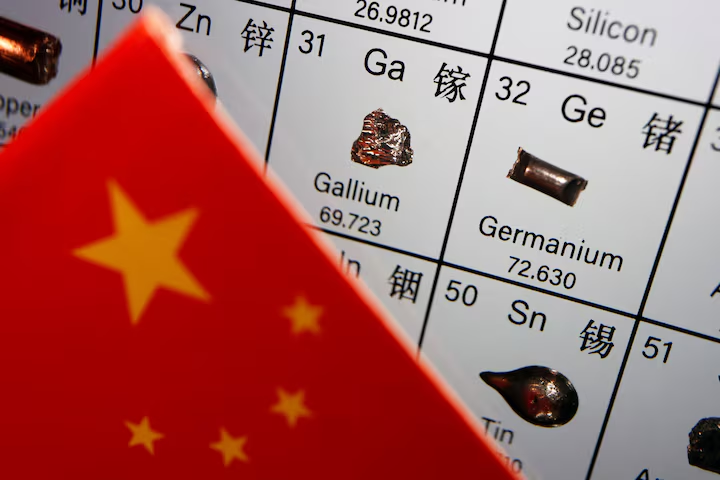China has suspended its ban on exporting gallium, germanium, and antimony to the United States, though exporters must still secure licences, Beijing confirmed.
Announced on Sunday, the move marks a partial easing of Beijing’s controls on critical minerals, following heightened trade tensions over the past year.
Between August 2023 and September 2024, China restricted exports of these three metals. In December 2024, Beijing escalated the measures, imposing a total ban on shipments to the US in response to Washington’s new chip-sector restrictions, Reuters reported. The ban created shortages for US buyers and forced some importers to route shipments through third countries.
These metals are essential for producing semiconductors, fibre-optic cables, ammunition, and flame retardants. Gallium and germanium are important in integrated circuits, LEDs, and photovoltaic panels, while antimony is widely used in flame-retardant materials. China dominates global supply: an EU report last year estimated Beijing produces 94 per cent of the world’s gallium.
China’s Ministry of Commerce clarified that the suspension will remain in effect until 27 November 2026. However, the metals remain on China’s dual-use export control list, meaning exporters must still apply for licences for all international sales. The ministry stressed that the suspension does not reverse the earlier decision to include the three metals on the control list.
Additionally, the ministry eased rules on exporting certain dual-use graphite products to the US, reducing the level of scrutiny for licences. Observers say these moves indicate a broader effort by Beijing to manage trade tensions while retaining leverage over critical materials.
Read more: NevGold closes its Nutmeg Mountain acquisition with Goldmining for $3 million
Read more: NevGold’s long intervals of antimony & gold mineralization turn heads
Restrictions continue for exports to US military users
The suspension comes shortly after a meeting between US President Donald Trump and Chinese President Xi Jinping in South Korea. Analysts suggest this meeting may have contributed to the decision. Meanwhile, US companies reliant on gallium, germanium, and antimony will need to navigate licensing requirements carefully to ensure continued access.
Furthermore, restrictions continue for exports to US military users. The December 2024 measures that blocked military-related shipments remain intact. Consequently, companies dealing with American defence entities will face ongoing regulatory hurdles.
The United States government can turn to domestic mining firms to supply critical materials for military contractors.
One example is Perpetua Resources Corp (TSE: PPTA) (NASDAQ: PPTA), whose Stibnite Gold Project in Idaho holds one of the only known antimony reserves in the country. The project gained status under the FAST 41 program, which speeds up permitting for vital infrastructure. As a result, Perpetua’s operation could help meet demand for antimony in ammunition, alloys and flame retardants.
In addition, NevGold Corp (CVE: NAU) (OTCMKTS: NAUFF) (FRA: 5E50) in Nevada is advancing its Limo Butte gold antimony project. The company announced up to 85 per cent antimony recovery from recent tests. It aims to provide a domestic source of this mineral, which China has dominated globally.
NevGold Corp is a sponsor of Mugglehead news coverage
.














